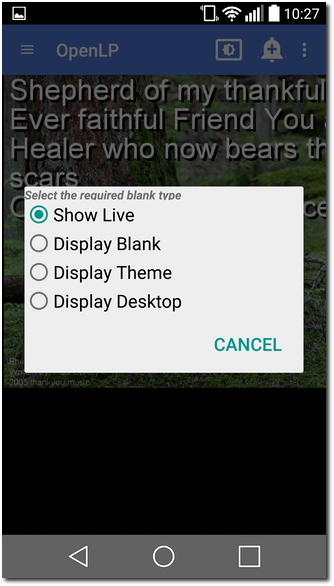6.2 KiB
Android App
Installation
OpenLP gives you the ability to control your service from an Android based smartphone. The following tutorial will describe how to install and use the application. For this example we will be using a LG G2. Other Android smartphones or tablets may vary slightly in appearance.
Open the Google Play Store app and search for OpenLP, and
you will find OpenLP - Remote 2. As an alternative use this
link to go to the apps page in Google Play Store. Now install the
app.
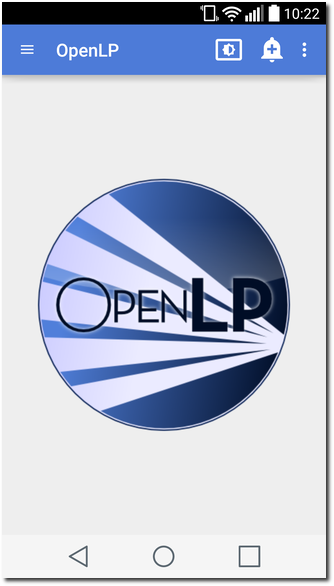
You can now start the app and when you do you will see the startup screen.
Android application settings
After the installation is complete and you open the OpenLP Android application you will need to configure your preferences and settings.
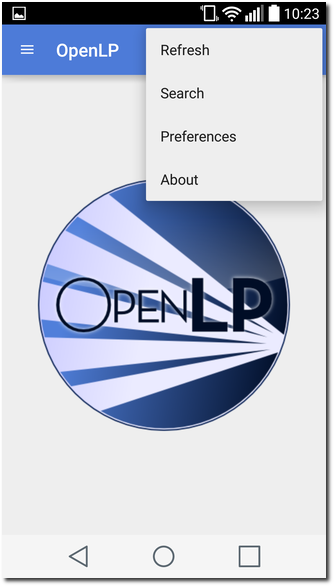
Open the settings by opening the menu in the top right corner and
choosing Settings.
This will show the preferences.
Display Text Size
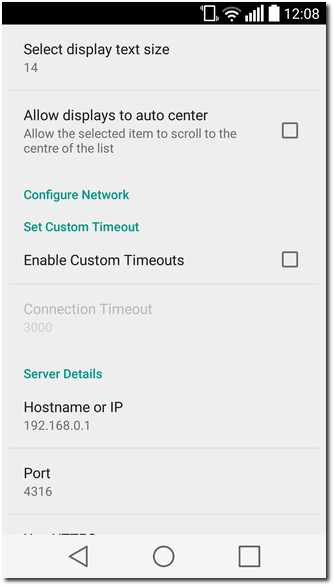
- Select display text size:
-
This allows you to change the font size for the application display.
Auto center display
- Allow displays to auto center:
-
Check this box to allow the selected item to scroll to the centre of the list.
Set Custom Timeout
In general the OpenLP Android application will work fine without having to change the custom timeout settings. If you experience connection issues or are having trouble staying connected, you can change these settings.
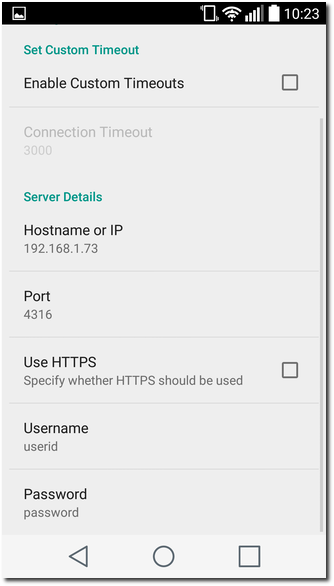
- Enable Custom Timeout:
-
Check this box to enable setting a custom timeout.
- Connection Timeout:
-
Once Custom Timeout has been enabled you can set a custom connection timeout here.
Server Details
You will need to configure the server settings you will use with your
phone. You can find these instructions and settings in the OpenLP
desktop application under remote_tab.
Note: To use the Android application you will need to be on the same network as the main computer.
- Hostname or IP:
-
Enter the
Server on IP addressfound inremote_tab. After entering the IP address in the box selectOK - Port:
-
Enter the
Port numberfound inremote_taband enter it in the box. By default this is 4316. After entering the port number selectOK. - Use HTTPS:
-
This specifies if HTTPS should be used. Note: To use HTTPS you must setup OpenLP to be secure, see
secure_server. - Username:
-
Here you can enter a username used for accessing OpenLP remotely. This must be the same as set in
user_auth. - Password:
-
Here you can enter a password used for accessing OpenLP remotely. This must be the same as set in
user_auth.
Using OpenLP Android Application
After you have completed the setup you are now ready to use the app. Touch the menu button in the top left corner to see the list of views the app supports.
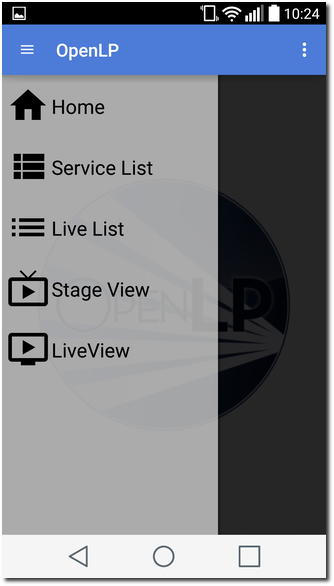
Service List
Selecting Service List will take you to the Service
Manager. Selecting an item with a in the service manager will
immediately take it live on the projection screen and you will stay on
the service screen on your device. You can use the arrows buttons shown
on the bottom left and right to move to the next slide inside the
item.
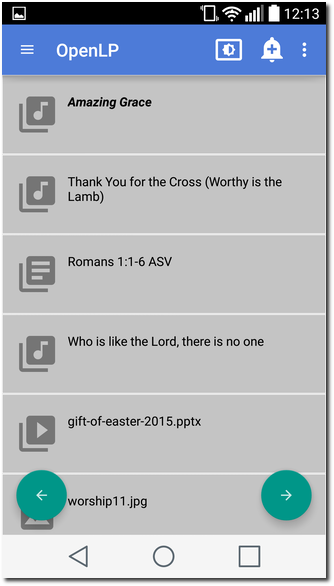
Live List
Selecting Live List will display what ever is in Service
Manager at the time, or what is live at the moment. If there are items
in the Service Manager they will be shown on the left, and the live item
will be shown on the right. You can use the arrows buttons shown on the
bottom left and right to move to the next slide inside the item.
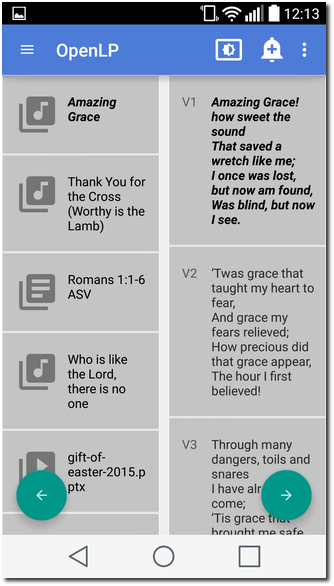
When using the Live List it can be an advantage to use the
device in landscape mode.
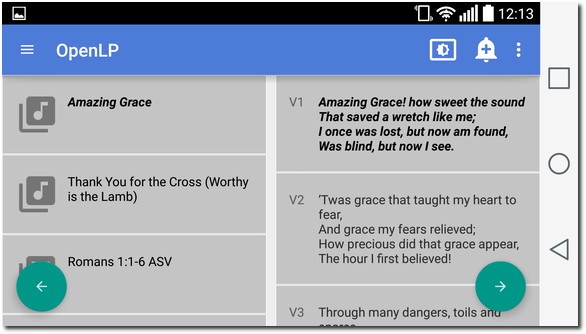
Stage View
Selecting Stage View will display the stage view on your
Android device. See the stage_view section in the manual for a detailed
description.
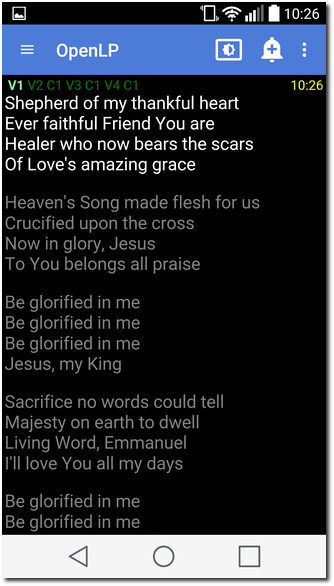
Live View
Selecting Live View will display the live view on your
Android device. See the main_view section in the manual for a detailed
description.

Alert
To send an alert to the display, touch the alert button at the top right of the screen.
 Alert button
Alert button
You can send an alert to the display by entering the text in the box
and clicking on Process. The alert will be displayed as you have
it configured in configure_alerts.
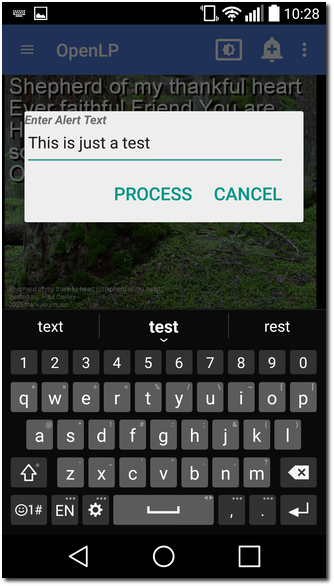
Blank Display
To blank the display, touch the blank button at the top right of the screen.
 Blank button
Blank button
Using the display blank type gives you the ability to blank your
screen to the methods described below. You can find out more about this
feature and how it operates on the main computer at blank_control.
- Show Live:
-
Do not blank, or unblank the display.
- Display Blank:
-
Choosing this option will blank your projector to black as if it were shut off.
- Display Theme:
-
Choosing this option will show your blank theme only, without lyrics or verses. If you are blanking a song with an assigned theme it will blank to that theme. If no theme is assigned or you are blanking a presentation or image, it will blank to the global theme.
- Display Desktop:
-
Choosing this option will show your desktop wallpaper or a program that you have open on the extended monitor or projector. You can seamlessly switch between the desktop wallpaper or a program and OpenLP by Blank to Desktop.
